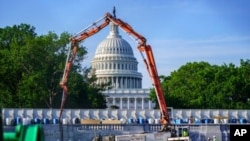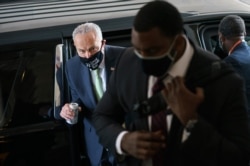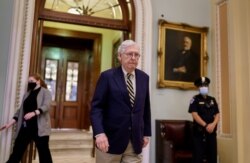The U.S. Senate pushed a $1 trillion infrastructure package over two more procedural hurdles Sunday night, with a final vote on the measure expected Tuesday.
A Sunday night vote of 69-28 blessed the details worked out by a bipartisan group of senators. A second vote of 68-29 limited debate on the overall bill.
The votes show solid support for the spending deal that would help repair the country’s deteriorating roads and bridges, expand broadband internet service, modernize rail and public transit systems and replace dangerous lead-pipe drinking water infrastructure.
The legislation calls for the largest investment in decades toward U.S. physical infrastructure, including roads, bridges, airports and waterways. Separately, Democrats are initiating a $3.5 trillion spending deal for social safety net programs that has drawn no Republican support.
The infrastructure package is one of President Joe Biden's top legislative priorities, in part to show voters that the White House and Congress can agree on bipartisan efforts to benefit the country at a time when politically divided Washington lawmakers are stalemated on numerous other issues.
Before the Saturday vote to advance the infrastructure bill, Biden tweeted, “We can’t just build back to the way things were before COVID-19, we have to build back better. The Bipartisan Infrastructure Deal and my Build Back Better plan will grow our economy and create an average of 2 million good-paying jobs every year over the next decade.”
Even though he, too, proposed infrastructure spending that failed to materialize, former President Donald Trump has attacked Republicans who support Biden’s package, saying they should wait until they control Congress again.
But a long-time Trump ally, Senator Mitch McConnell, the Senate's top-ranking Republican, indicated his support for the bill.
"Republicans and Democrats have radically different visions these days, but both those visions include physical infrastructure that works for all of our citizens," McConnell told the Senate. "The investments this bill will make are not just necessary, in many cases, they are overdue. Our country has real needs in this area."
If the Senate approves the measure, the House of Representatives would then consider it. Passage appears less certain in the House, where some progressive Democratic lawmakers are complaining that the spending package is too small.
The package includes $550 million in new spending, along with $450 billion in previously approved funds.
The deal includes $110 billion for roads and bridges, $39 billion for public transit, $66 billion for rail, and $55 billion for drinking water and wastewater infrastructure, as well as billions for airports, ports, broadband internet and electric vehicle charging stations.
Some information for this report came from the Associated Press, Reuters and Agence France-Presse.







